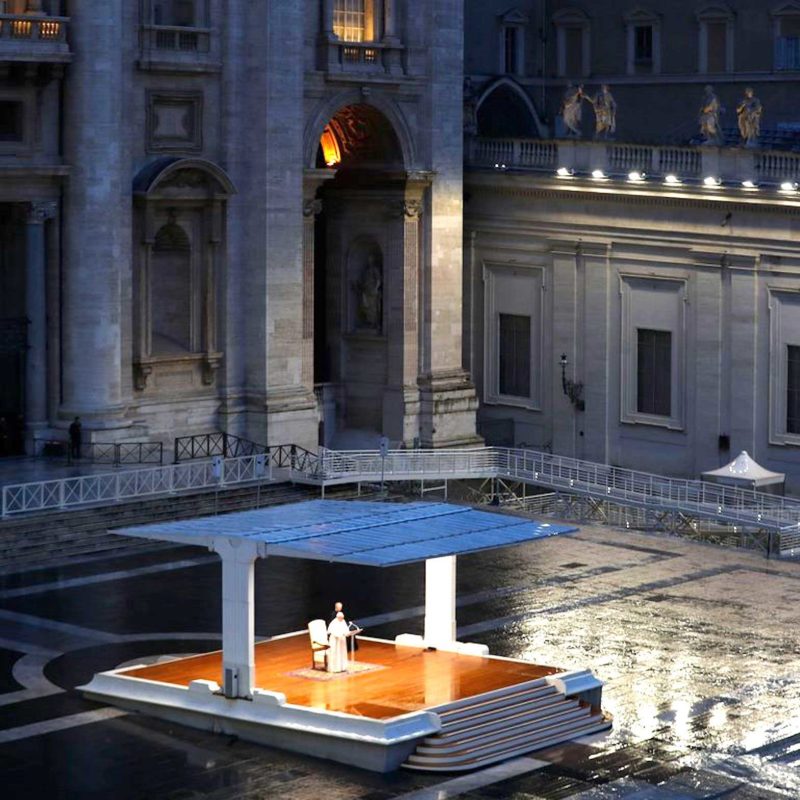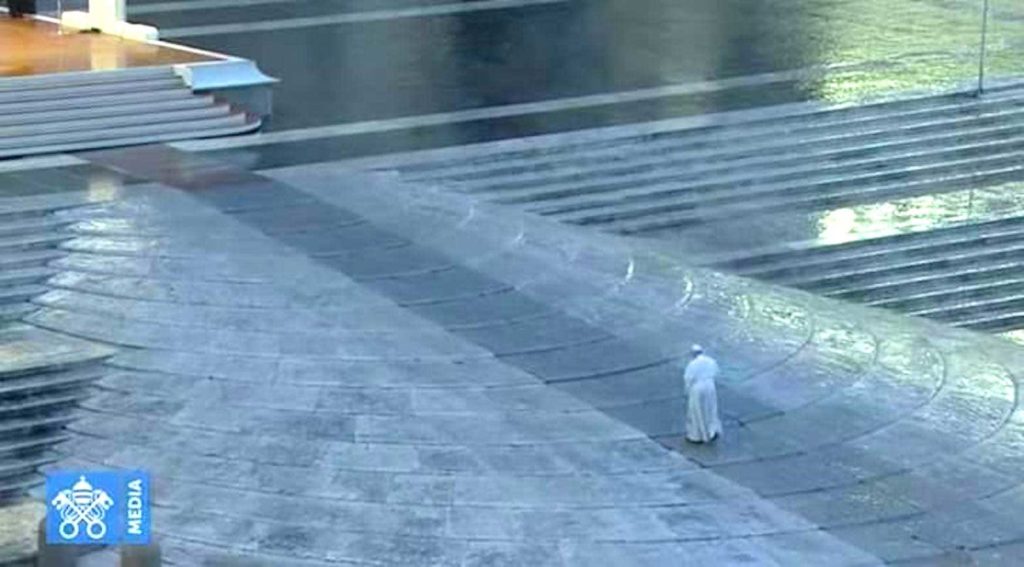Holy Week, holy silence

The Pope at an empty St. Peter’s Basilica. VATICAN.VA
The secular world is offended by forced silence or that sort of unnatural quietness imposed by COVID-19. The noise of rock music that could seduce the sensual chords of the restless heart and simultaneously damage the eardrums suddenly stopped. Hollywood movie and Netflix TV shoots, bombastic rock concerts, and clattering festivals are abandoned, while The Rolling Stones “No Filter Tour” and Justin Bieber’s “Changes Tour” are pushed back. The fans miss what they call rolling music, so earsplitting that the sound produced could reach 117 dB, which can knock someone down in the audience.
For Christians, however, silence is an important part of the traditional 40-day observance of the holiest of days in the liturgical calendar. Whereas noise fatigues the soul and distracts the heart, exterior silence gathers all our psycho-emotional and spiritual forces to bring inner peace, which St. Augustine (354 to 430) links to tranquillitas ordinis, “the tranquility of order.” In stillness and tranquility, a person, Christian or non-Christian, thinks deeper and better.
The famous international circus company Cirque de Soleil, with conspicuous presence in Munich, Tel Aviv, Perth, and Las Vegas, suspends all shows across the world and the summer Tokyo Olympics is scratched for the first time since World War II. Due to the virus crisis, more previously timetabled extravagant world events do not happen during this year’s Christian 40-day season of Lent, or what we Filipinos call Kuwaresma and Italians call quaranta giorni, meaning 40 days, where the English “quarantine” is derived. One adage has gone viral and I quote an excerpt:
“Suddenly Disney is out of magic.
Paris is no longer romantic.
New York doesn’t stand up anymore.
The Chinese wall is no longer a fortress, and Mecca is empty.”
The upbeat commotion of tourism and transport businesses ceases, and those who purposely drown themselves in an ocean of noise and distractions hate it. Overnight, the myriad sounds we hear in airports, train stations, bus terminals are gone as governments tell the public to stay indoors.
The coronavirus is imposing an extraordinary silence on the world’s noisiest places. Millions watched Pope Francis walking in silence at St. Peter’s Square under the Roman rain for his Urbi et Orbi blessing in March 2020, a sight that spoke a thousand sentiments. But silence, lest we forget, is an important part of the Christian liturgy.
The consumeristic society refuses to bear the sight and sound of an empty mall, the toned-down markets, the people-less streets. Seemingly, the contemporary soul can’t stand the disappearance of the crowds who murmur rowdily when buying and selling, or haggling. In a dramatic fashion, the sound of normalcy disappeared, only to be substituted by the spooky muteness of anxious fear. History is recording the sharpest decline of loudness created by humankind. And many are rejecting it, saying: “I don’t want the absence of sound; it bothers the soul.”

The Pope’s solitary walk to the altar. VATICAN.VA
For centuries, lest we forget, Christians are making silence holy during this time of the year. It is only coincidental that the COVID-19 pandemic and the Christian season of Lent happen exactly at the same time. The Holy Week goes on, albeit in a different mode of celebration. God’s redemption of humankind cannot be withdrawn and the Divine Mercy cannot be scratched from the Divine schedule. For two millennia, the Holy Week has been observed in holy silence.
“We can’t let Holy Week be just a kind of commemoration,” as St. Josemaría Escrivá has put it so fittingly (Homilia, 1960). La Semana Santa no puede reducirse a un mero recuerdo. “It means contemplating the mystery of Jesus Christ as something that continues to work in our souls.” it means the Week that happened 2,000 years ago and changed the world continues to transform people’s lives — in holy silence.
Apparently forced by an out-of-the-blue but deadly phenomenon called COVID-19, the Christian is forced to practice the exterior quietness, albeit eerie, that avoids all types of distractions. This year’s exterior quietness becomes a desirable partner of a profound self-diagnosis, soul-searching, or discernment of what matters most in life. This year’s exterior quietness, forced by the pandemic circumstance, prepares the Christian for interior silence, exterior quietness being the beginning of asceticism and interior silence being the introduction to mysticism.
In Christian mysticism, the mortal soul finds himself alone with the Immortal God. Only God, and God is enough — a truth that today’s secular and restless world, which loves the noise and hates silence, cannot fully understand.
“After the wind there was an earthquake, but the Lord was not in the earthquake. After the earthquake came a fire, but the Lord was not in the fire. And after the fire came a gentle whisper” (1 Kings 19:11-13). And God is resides in the soul.
Jose Mario Bautista Maximiano (https://www.wordcon.ph/wordcon-speakers) is the author of 24 PLUS CONTEMPORARY PEOPLE: God Writing Straight with Twists and Turns (Claretian, 2019) and MDXXI (1521): 500 YEARS Roman Catholic (Claretian, 2020).

